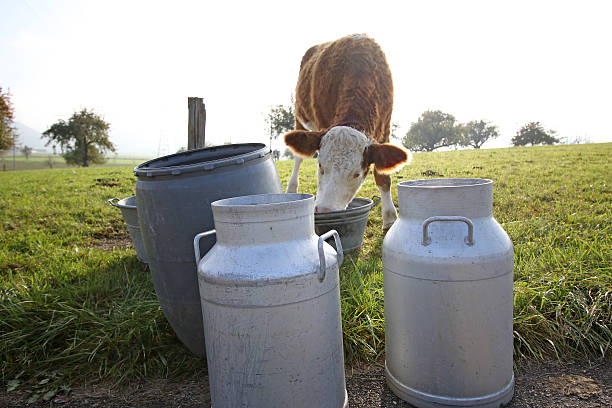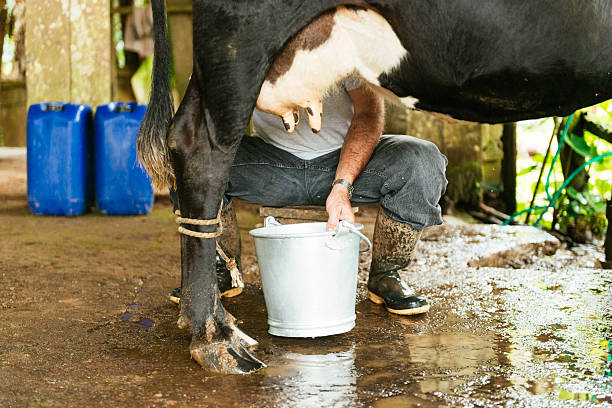- Basinikonda, Madanapalle, Annamayya (Dist), AP, Pin - 517325.
- imforupvtltd@gmail.com
About Dairy Farming
Dairy Farming: An Overview
Dairy Farming is a specialized branch of Agriculture focused on the breeding and Management of Dairy Cattle for Milk Production. It plays a vital role in both the Agricultural Sector and the Wider Food Industry by supplying essential Dairy Products such as Milk, Cheese, Butter, Yogurt, and Ice Cream. Below is an outline of the key elements that define modern dairy farming.
Dairy Cattle Breeds:
Dairy farming utilizes a variety of Cattle Breeds, each offering unique traits suited to different production goals. Here are some of the most commonly used breeds:
Holstein – Renowned for their exceptional milk yield, Holsteins are the most widely used dairy breed around the world.
Jersey – Valued for producing milk rich in butterfat, making it ideal for premium butter and cheese products.
Guernsey – Recognized for their rich, golden-hued milk, which contains high levels of beta-carotene.
Ayrshire – A hardy and adaptable breed, Ayrshires offer consistent, moderate milk production across diverse farming systems.
Brown Swiss – Noted for their strength, longevity, and milk that boasts high protein content, ideal for cheese-making.
Milk Production Process:
Producing High-Quality Milk involves a series of well-managed steps to ensure animal health and product safety:
Feeding – Nutrition is key to maintaining healthy cattle and maximizing milk production. Dairy cows are provided with a balanced diet that includes forage such as hay or silage, along with grains and supplements.
Milking – Cows are usually milked two to three times daily using modern milking machines. Maintaining strict hygiene and consistent routines helps ensure milk quality and reduces the risk of infections like mastitis.
Milk Storage – Once collected, milk is quickly cooled and stored in refrigerated bulk tanks to preserve freshness and prevent bacterial growth before being transported to processing facilities.
Animal Health and Welfare:
Ensuring the well-being of dairy cattle is essential for both Ethical Farming and Optimal Productivity. Key aspects include:
Veterinary Care – Routine health check-ups, vaccinations, and timely medical treatment are essential to prevent and manage diseases.
Housing – Cows are provided with clean, comfortable living spaces featuring adequate ventilation, soft bedding, and enough room to move freely, reducing stress and promoting good health.
Breeding and Calving – Breeding programs are carefully managed to support reproductive health, ensure safe calving, and promote the well-being of both mother and calf.
Environmental Impact:
While Dairy Farming plays a vital role in Food Production, it also comes with environmental responsibilities. Effective management practices are essential to minimize the impact on natural resources:
Manure Management – Responsible collection, storage, and application of manure help prevent water and soil pollution while enhancing soil fertility as a natural fertilizer.
Water Usage – Efficient water management, including recycling and conservation techniques, helps reduce water waste and supports sustainable farm operations.
Sustainable Practices – Adopting eco-friendly methods such as rotational grazing, cover cropping, and the use of renewable energy sources contributes to reducing the farm’s overall environmental footprint.



Economic Aspects of Dairy Farming:
Dairy farming is a resource-intensive enterprise that requires significant Financial Planning and Management. Key economic components include:
Infrastructure Investment – Substantial capital is required for building and maintaining facilities such as barns, milking parlors, storage units, and modern milking equipment.
Operational Expenses – Day-to-day costs include feed, veterinary services, labor, utilities, and maintenance—all crucial for maintaining herd health and productivity.
Market Influences – The profitability of dairy farming is closely tied to market forces such as milk pricing, consumer demand, government regulations, and international trade trends.
Technological Advancements in Dairy Farming:
Modern dairy farming increasingly relies on Innovative Technologies to boost Efficiency, Productivity, and Animal Care. Key advancements include:
Automated Milking Systems – Robotic milking machines allow cows to be milked on demand, reducing labor needs while ensuring consistent milking routines and improved animal welfare.
Data Management Tools – Advanced software solutions are used to monitor and analyze milk production, track herd health, manage feeding schedules, and optimize overall farm operations.
Genetic Improvement – Through selective breeding and genetic testing, farmers can enhance desirable traits in cattle—such as higher milk yield, better disease resistance, and improved milk quality.
Challenges and Opportunities in Dairy Farming:
Dairy farmers navigate a range of challenges, including volatile milk prices, Climate Change impacts, and Animal Health Concerns. These factors can affect both Productivity and Profitability. However, the industry also presents significant opportunities:
Value-Added Products – Expanding into cheese, yogurt, butter, and other processed goods can increase revenue and market reach.
Organic and Ethical Farming – Growing consumer demand for organic, hormone-free, and ethically produced dairy opens new avenues for premium pricing and brand loyalty.
Sustainable Practices – Adopting eco-friendly and efficient farming methods not only reduces environmental impact but also aligns with evolving market expectations.
- In conclusion, dairy farming is a complex industry that combines traditional expertise with modern technology. This approach ensures the efficient production of high-quality dairy products, prioritizes animal welfare, and minimizes environmental impact.



Encouragement for Small-Scale Dairy Farming Investment:
Dear Aspiring Dairy Farmer,
- Embarking on the journey to start your own dairy farm is a bold and rewarding step—one that holds the potential to bring meaningful benefits to you, your family, and your community. Here’s why investing in small-scale dairy farming is a smart and fulfilling choice.
Personal Fulfillment & Growth
- Dairy farming offers more than just financial returns—it brings a deep connection to nature, animals, and the rhythms of rural life. Each day is filled with opportunities to learn and grow, from mastering animal care to developing farm management skills. It’s a lifestyle that fosters resilience, responsibility, and a strong work ethic.
Sustainable and Reliable Income
- A well-managed small herd can provide a consistent source of income through daily milk production. Expanding into value-added products like cheese, butter, and yogurt can further boost your profits. With smart planning, even a modest investment can yield sustainable and long-term financial rewards.
Positive Community Impact
- By producing fresh, local milk, you contribute directly to the well-being of your community. Your farm supports local supply chains—from feed suppliers to retailers—and strengthens the rural economy. Your work helps ensure families have access to healthy, homegrown dairy products.
Environmental Responsibility
- Small-scale dairy farms often lead the way in sustainable farming. Practices such as composting manure, rotational grazing, and responsible water use help reduce environmental impact. Your farm can become a model of stewardship—promoting biodiversity, healthy soil, and a lower carbon footprint.
Flexibility and Independence
- Owning a small dairy farm gives you control over your operations. You can make hands-on decisions, try out new methods, and tailor your approach to suit your values and goals. Whether experimenting with different breeds or exploring organic practices, the path is yours to shape.
Creating a Legacy
- A dairy farm is more than a business—it’s a legacy. It’s a place where values are passed down, where children learn the importance of hard work, and where future generations can grow and thrive. By starting today, you’re building something meaningful that can last for years to come.


Taking the First Steps:
Start Small: Begin with a manageable herd size and gradually expand as you gain experience and confidence in your farming abilities.
Education and Training: Leverage available resources such as agricultural extension services, online courses, and local farming networks to enhance your knowledge and skills.
Plan and Budget: Create a solid business plan and budget to guide your investments and operations, ensuring steady and sustainable growth.
Remember, every successful dairy farm started small. With passion, dedication, and thoughtful investments, you can lay the foundation for a prosperous farming venture. Embrace the challenges, celebrate your progress, and know that each step brings you closer to your farming goals.
Wishing you the best of luck on your dairy farming journey!
Warm regards,
Valipi Reddy
CEO, IMFORU PVT. LTD.
